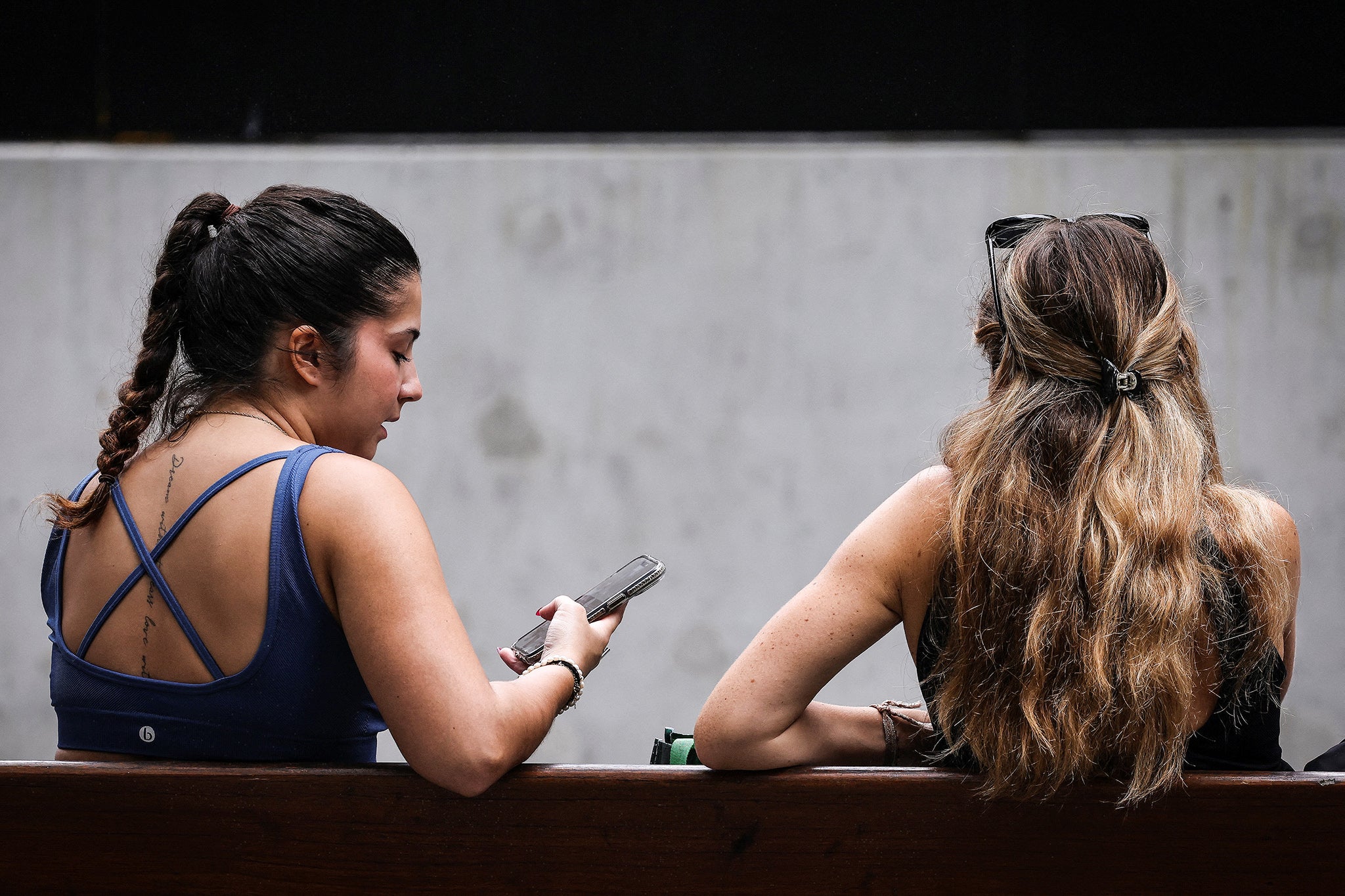It’s time to ‘divorce’ your children from their phones
It’s the love affair of the century, but if adults can’t cope with the relationship they have with their phones, how on earth are our children meant to navigate one? Zoë Beaty talks to the parents instigating an enforced separation between their teenagers and their tech...


It’s a discussion that has become a weekly occurrence in Soban Bashir’s home: a “game” that many parents will be familiar with – one of stubbornly sticking to your guns, played on both sides. The game goes like this: Bashir’s son, who is currently in year 7, asks if he can have a phone, Bashir says no. He asks if he can have it to just join WhatsApp, Bashir says no. “And then, the next week, it starts all over again,” he says.
It’s a dilemma that has become a defining part of modern parenting. Since smartphones became an essential part of our daily lives, owning one is now a rite of passage of sorts – for kids, it means more freedom, more kudos, one step closer to the tantalising allure of adulthood. For parents, it’s complicated.
According to Ofcom, an estimated 91 per cent of 11-year-olds in the UK now own a smartphone. In the US, 42 per cent of children have one by the age of 10. A European survey by the London School of Economics, EU Kids Online, found in 2022 that the majority of children in 19 European countries report using their smartphones daily or “almost all of the time”.
“This marks a substantial increase in both the proportion of smartphone-using children, as well as the amount of their internet use compared with the EU Kids Online 2010 survey,” they noted in the report.
It’s cause for concern. Cyberbullying, access to harmful content – 90 per cent of girls and 50 per cent of boys of secondary school age say they’re sent explicit content that they didn’t want to see, according to grassroots movement Smartphone Free Childhood.
The threat of grooming is constantly there (one primary school teacher says almost every one of the children in his class, boys and girls, has been approached by a stranger online at some point), and basic issues like academic distraction are just some of the dangers kids now face online.
Both academically and anecdotally, the effects of social media on children’s mental wellbeing are now emerging – Bashir’s wife, a GP, is often worried by the number of teenagers presenting in her office with acute anxiety.
Some countries are taking note, and introducing pioneering – and controversial – measures to help protect young people from the dangers of the internet. Earlier this week, Australian prime minister Anthony Albanese announced that “world-leading” legislation would be introduced this month, to be enacted in the country late next year.
The law will institute an age limit of 16 years for children to start using social media – and platforms like Instagram, TikTok, Snapchat and X will all be held responsible for ensuring their compliance. “Social media is doing harm to our kids and I’m calling time on it,” Albanese said during his announcement.

In the UK, Sir Keir Starmer has been urged to back a similar ban. The Safer Phones Bill, introduced to parliament last month, would raise the age of “internet adulthood” from 13 to 16 and legally ban phones from classrooms, among other recommendations. Starmer responded that he was against “simply banning” children’s phones.
Bashir, who has three sons aged 8, 11 and 16, was disappointed with the response. Initially, he didn’t think twice about giving his eldest son an iPhone when he started secondary school – really, it’s now par for course, and the phone was programmed to only send texts and make phone calls.
“But then, social media apps started to creep in,” says Bashir, 44, from Rochdale. “He asked for WhatsApp first, then, when he reached year 10, for Snapchat, too. We set up the parental controls but, of course, Snapchat has features like disappearing messages. We started doing spot checks on the phone and, soon after, we found some inappropriate messages on there – I won’t say exactly what. But it just wasn’t appropriate. I started to realise we shouldn’t have given him the phone in the first place.”
His son’s phone was taken away for six months – and now, it’s his 11-year-old’s turn to plead for one. But, despite the battle, Bashir is “firmly resolved” to stick with it.
He joined the Smartphone Free Childhood campaign, set up by Daisy Greenwell and Joe Ryrie in February this year, in May. The campaign began accidentally after an Instagram posted by Greenwell – then a WhatsApp group – went viral. Over the course of the year, more than 150,000 parents have joined forces to “change the culture around kids and smartphones”, they say.

Of course, some parents disagree with the principle. There’s a cool-headed argument that allowing young people phones as they begin to move around the world independently is actually for their own safety.
They also allow kids access to communities they might not otherwise be able to feel part of, at a sensitive time of development. Also, gaming is said to be the real problem when it comes to grooming and phones, like it or not, are a staple part of all of our lives – wouldn’t digital literacy be a better approach?
The thing is, says mother of two Amy Ruffell, 42, though there are positives, all too often they’re perilously outweighed by negatives. “We talk about young people who have really big questions about the world – maybe, for instance, it’s about their sexuality. I’m a gay woman,” she adds. “Maybe it’s about sexuality, or about your gender, or being bullied, or anxiety, or feeling like you’re never going to have a boyfriend.
“The thing is, asking the internet, rather than talking it through with a person, means you’re at risk of falling into the most extreme version of that rabbit hole, and having an idea or advice served to you on social media that you would never have thought about in a million years,” says Ruffell, from Cambridge. “And that warps your worldview, rather than expanding it.
“When you’re asking, ‘What is the right age for my child to have a smartphone?’, what you’re really asking is, ‘What’s the age you think it’s appropriate for them to see hardcore porn?’”
It’s not just about accessing information, she says, but the right information and the right supportive environment. In an online world increasingly overwhelmed by misinformation, it makes some sense. Recently, her son’s headteacher explained that the weight of social media and exposure to 24/7 news – quite terrifying news, at that – was making kids more and more stressed. “There’s no wonder there’s a mental health crisis among young people,” she says.

She also realises that this isn’t a problem confined to young heads. Both she and Bashir admit that they’re also phone addicts – presumably a cutting irony for most parents. We know this world and its effects all too well: we created it.
Millennials like Ruffell and Bashir, the so-called “always-on” generation, were those who sleepwalked into sharing hundreds of photos on Facebook in the mid-2000s, and who created words like Fomo to articulate the new anxieties social media addiction bore. Our parents, lest we forget, faced the same dilemmas when we begged to use AOL chat rooms in the early 2000s.
Essentially, what these parents are saying is that we got it a bit wrong. We’ve created – and continue to create – a bit of a mess. Now the genie is truly out of the bottle, the least we can do is protect our children from the chaos.
They’re now among thousands of others encouraging other parents to join them in holding out for as long as possible before introducing kids to this world. It’s a conversation that’s set to continue long into the future as the internet continues to evolve.
“I think what’s important to me is that we recognise, as parents, that we do have a choice,” says Ruffell. “It may not feel like it at the moment. But we do. My kids might be young but I already feel worried about what they might face when they’re a few years older.
“You just can’t escape it. But you can try to improve it. My hope is that by the time my kids are older, we’ll have figured it out a bit more. I hope we can get there.”
Where do you stand on this issue?





Join our commenting forum
Join thought-provoking conversations, follow other Independent readers and see their replies
0Comments